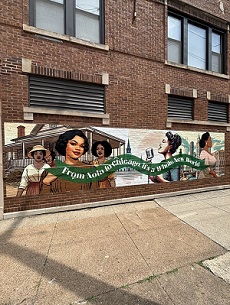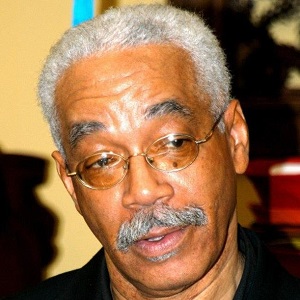What makes a person committed and dedicated to civil rights and social justice? We asked that question of C. Betty Magness, the Illinois Political Director for the Rainbow Push Coalition.
Betty believes that the seed for justice and civil rights had been implanted in her spirit at birth. She remembers an incident that happened to her as a firstgrade student at Louis Chaplin Elementary school that may have ignited her life-long crusade against racism.
Betty was in the girl’s bathroom when a little white girl pulled up her dress and Betty instinctively slapped her. She was, of course, the only one taken to the principal’s office and her parents were called to the school. When her father arrived, she was sent home. She later found out that the little girl wanted to see if she had a tail. “My mother immediately transferre me back to Burke Elementary School.” Betty recalls.
It was at Burke that her teacher, Mrs. Clayton, told her students t who were successful in high school were high achievers in Algebra and English. Betty listened and learned, and in 1955, she entered Hyde Park High School as an honors student.
Every summer, many of Betty’s friends and some family members went South to visit family; however, Betty remained in Chicago. Her parents realized that regardless of how they “schooled” her on the rules for Blacks and whites in the South, Betty would probably not follow them. In the summer of 1955, Emmett Till was falsely accused of whistling at a white woman and brutally murdered in Mississippi. Betty added. ”My parents knew that even as a child in first grade, I spoke out and defended myself. My mother did not want to even imagine what I might possibly do!”
Her first memory of her high school years was not being permitted to be a member of Hyde Park’s cheerleader team although she could shout the cheers and execute the moves as good or even better than others who auditioned, she believes the reason was not accepted was because of the color of her skin. Most of the cheerleaders were either white or had a fair skin tone. Back in those days (1930s to 1960s), women who had a fair skin tone were called “light skinned.” Betty was a beautiful chocolate brown.
Even in high school, Betty Magness was an excellent writer and was one of the few Black students assigned to write for the school newspaper. Her first story was about her fellow student, Conrad Worrill. She wrote about how Conrad pretended to jump on the train track to prove that he could.
With a true concern for the wellbeing of citizens of our society, Betty credits her Civics teacher, Mrs. Friedlander, for awakening her interest in politics. Each day in Mrs. Friedlander’s class, her students were required to read something in the newspaper that focused on politics, and they were required to bring those clippings about political events to class. They were also required to know and discuss important issues surrounding Illinois U,S. Senator Paul Douglas.
After graduating from Hyde Park High School in 1959, Betty attended Wilson Junior College and participated in her first boycott. Black and white women joined together to protest their lack of civil rights. Their issues were resolved and Betty’s enthusiasm for equal rights was heightened, along with her recognition of the powerful results that can be gained through protesting and boycotting.
It was during the late 60’s that the Montgomery Bus Boycott captured Betty’s attention. Seeing churches and homes bombed by the Ku Klux Klan was the fuel that set Betty’s quest for civil rights and desegregation ablaze.
Her respect and admiration for Dr. Martin Luther King, Jr. led her to join Dr. King’s non-violent Civil Right Movement. She also became a member of Operation Breadbasket, under the leadership of Rev. Jessie L. Jackson. Betty worked in the Operation Breadbasket office as a volunteer. Working in the office was an interesting choice, since she had been active in several successful protest marches. But for Betty, working in the office was her best choice. Even though she respected the nonviolent approach, the physical altercations that most marchers endured were in stark opposition to how she would diffuse a hostile situation. Betty admitted, “I didn’t believe in turning the other cheek!”
At the time, Betty was a member of Grant Memorial AME Church. And unlike Rev. Jackson, whose attire was jeans and a sweat dashiki, the ministers at her church were dressed in robes or suits. Betty thought Operation Breadbasket was like a church – with explosive gospel music and singers, teachings that had a tone of preaching, even mixed with scriptures, and messages that sounded like sermons on why God wanted us to succeed and directions to achievement. All of the teaching focused on the peace, justice, and equality that can be realized when we understand three simple words: “I am somebody.” Knowing that, Betty was fired up. She soon changed her church membership and became a member of Fellowship Missionary Baptist Church, and Rev. Clay Evans became her pastor.
In 1960, Betty married Otis Land and gave birth to her first son, Tony Land. That marriage lasted three years. In 1965, she married William E. Magness, a Record Company Executive, and gave birth to her second son, Michael Magness.
Betty was a devoted mother with a fulltime job and a committed volunteer for Operation Breadbasket. She also found time to volunteer for her church, Fellowship Missionary Baptist Church, and for Lou Palmer’s Black Xpress paper and for Operation Breadbasket. How was she able to do all of this? Simple! She is a well-organized person.
An asset to Operation Breadbasket, Betty was never late and never missed a day of work. An excellent writer who also took shorthand, Betty served as the secretary to Richard Thomas, the Executive Director of Black Expo. She took and transcribed meeting notes as Black Expo contracted celebrity talent, such as Cannonball Adderly, Nancy Wilson and other performers. Betty later became one of the teachers of their Political Education classes.
Over the years, Betty has been employed by Jet Magazine , published by Johnson Publications,- Procter and Gardner Advertising Agency, and WIND Radio.
From 1986 to 1988, Betty was the Midwest Regional Director for the Jesse Jackson ’88 Presidential Campaign. Later she served as the scheduler for Carol Mosley Braun the Cook County Recorder of Deeds. She later transferred to the Clerk of the Cook County Circuit Court in the Child Support Department.
Betty retired from the Clerk’s office in 2009 but continues to work for Rev. Jesse Jackson’s Rainbow PUSH Coalition. She teaches Political Education to a variety of organizations and young students. She is also on the Board of Independent Voters of Illinois – Independent Precent Organization (IVI IPO). Betty is also the Vice President of the League of Women Voters’ Chicago Board, Vice Chair of Chicago Women Take Action (CWTA), a member of the Citizens Action Illinois Policy Council and remains a faithful member of Fellowship Missionary Baptist Church also known as Fellowship Chicago, where Rev. Reginald Sharp, Jr. is pastor. Betty is also a faithful member of the church choir. Betty is the proud grandmother of five children (one deceased). Her son Tony Land is an associate minister. Sadly, in 2022, her son Michael made his transition.
Some consider Betty a Political Insider – Others maintain she knows every politician and civil rights leader from here to China. Many consider her the “go to person” for anyone seeking to run for a political office or who has a question small or large about Chicago’s political history. She is all three.
Betty believes in mentorship, in giving back. Betty’s final words for this article were, “In this world, it is up to us to give young people a way to follow. If I leave this world today, I leave knowing that have taught some young people to do what I do. And with that knowledge comes the belief that I have done some good.”






